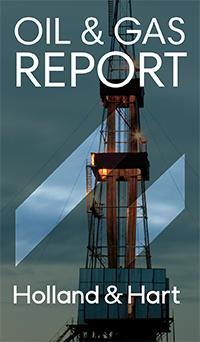Lease Suspension and Reduction of Royalty Rates Available
Late on April 21, 2020, the Bureau of Land Management (BLM) issued two separate Interim Guidance statements to help alleviate some of the industry’s and BLM’s hardships created by the COVID-19 pandemic and the dramatic collapse of oil prices.
Interim Guidance for Lease Suspension Requests During the COVID-19 National Emergency
Federal oil and gas leases may qualify for a suspension of production or a suspension of operations due to force majeure provision of Section 17 of the Mineral Lease Act of 1920. Both types of suspensions toll the lease term, but the lessee must continue to pay any rental or minimum royalty payments that are due during the suspension.
- Suspension of Operations (SO) suspends the operational obligations of the lessee on a lease where operations have begun. No operations can be conducted on the lease during the suspension. However, we note that casual uses that do not require a permit or routine maintenance are allowed.
- Suspension of Production (SP) suspends the production obligation of the lessee on a lease where production has already been established. A lessee may continue to conduct operations on the lease.
To apply for the SO or SP under this Interim Guidance, the application must be executed by all operating rights owners and include the following:
- Statement of the circumstances that render such relief necessary relative to the COVID-19 national emergency, despite the lessee’s due care and diligence (i.e., shelter-in-place mandates, quarantines, curtailment of travel, promoting social distance has caused lack of contractor and employees available to access and operate well sites, safety concerns, etc.);
- Lease numbers;
- Lease expiration and/or held by production dates;
- Current lessee(s) and operating rights owners; and
- Supporting evidence of the COVID-19 impact.
The application must be submitted to the appropriate BLM State Office.
If requesting the SO or SP for the suspension of operation or production obligations for an approved federal unit, the application may be executed by the unit operator on behalf of operating rights owners of the unitized tracts. Note, a unit SO or SP only suspends the obligations under the unit agreement not the obligations of individual federal leases. A separate application must be separately requested for a suspension of the specific committed lease.
BLM will have five business days to review the application. Once approved, it will be effective on the first day of the month the completed application is filed, or the date specified by BLM.
The SO or SP will expire one year from the date BLM approves the suspension or earlier if the operator resumes operations or production prior to the one-year date.
The Interim Guidance specifically does not apply to Indian leases.
Interim Guidance for Royalty Rate Reduction Requests for Oil and Gas Leases during the COVID-19 national emergency
Due to the COVID-19 national emergency and collapse of oil price, federal oil and gas leases may qualify for a royalty reduction under 43 CFR Subpart 3103.4-1.
To apply for a temporary royalty rate reduction under this Interim Guidance, the application must be executed by the operator/payor and include the following:
- A self-certification statement with supporting documentation from the operator that the lease would be capable of production in paying quantities were it not for the extreme circumstances presented due to COVID-19 pandemic.
- A simple economic analysis table that shows the lease(s) that is/are uneconomic at the current royalty rate, but would be economic with a royalty rate reduction, including:
- Relevant market oil price (i.e., West Texas Intermediate spot price or basin level price);
- Royalty rate;
- Production capability; and
- Operating costs (summarized for the lease)
- The requested temporary royalty rate (i.e. reduction from 12½ to 0.5%)
All trade secrets or other proprietary data – operating costs and related data – should be marked as “confidential/proprietary.”
This Interim Guidance and application process described above also applies a reduction for Class II reinstated leases as provided for in 43 CFR 3103 and 3108.2-3(f).
BLM will have five business days to review the application. Once approved, the royalty reduction will be effective on the first day of the month the completed application is filed, or the date specified by BLM.
The royalty rate reduction will terminate one year from the date BLM approves the application; thereafter, the lease will revert to its original rate.
The Interim Guidance specifically does not apply to Indian leases.
We encourage you to visit Holland & Hart’s Coronavirus Resource Site, a consolidated informational resource offering practical guidelines and proactive solutions to help companies protect their business interests and their workforce. The dynamic Resource Site is regularly refreshed with new topics and updates as the COVID-19 outbreak and the legal and regulatory responses continue to evolve. Sign up to receive updates and for upcoming webinars.
